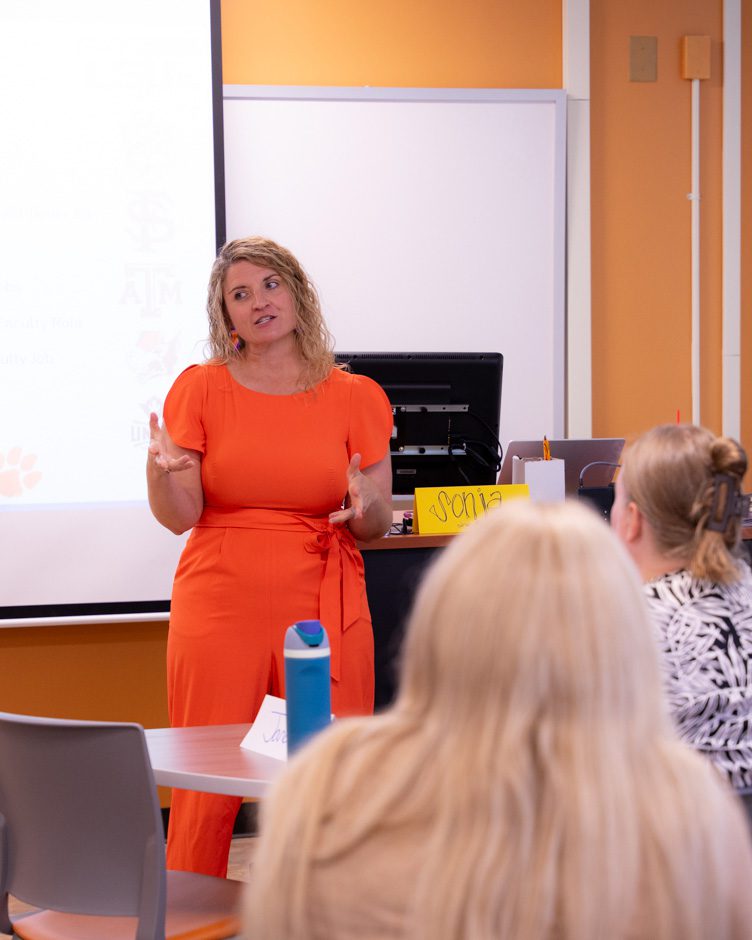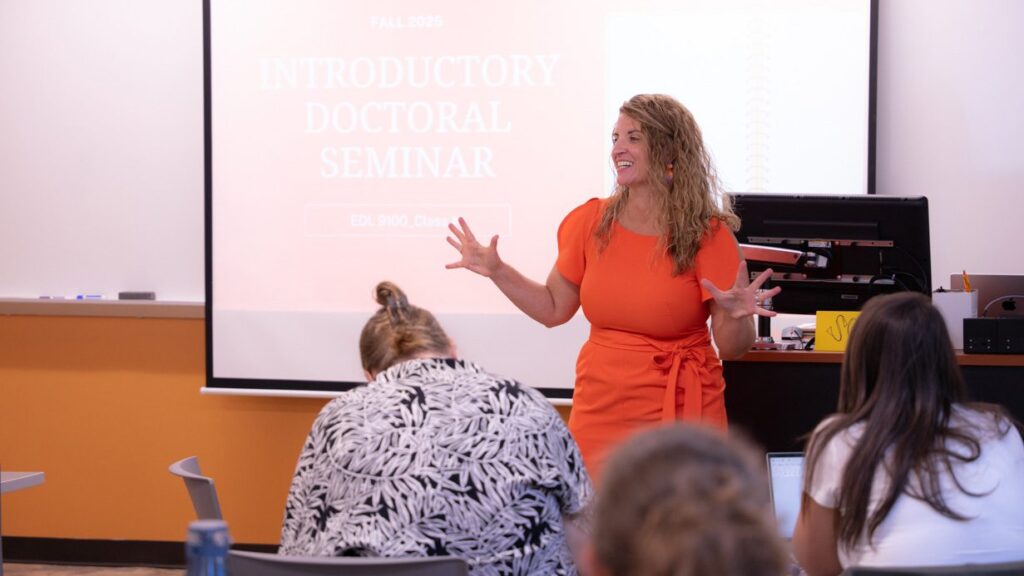Sonja Ardoin, associate professor of higher education and student affairs, loves the act of teaching, and it comes through in how she analyzes the very nature of the give and take with her students.
She believes that learning and teaching are shared processes. While teachers have the content knowledge and experience that permit them to instruct the course, students also bring knowledge, skills and experiences to the classroom. She knows she is on the right track when the curriculum feels different every time she teaches it; after all, that curriculum is being explored with a new group who should bring a distinctive perspective to the content.
Ardoin is a first-generation college graduate from a working-class, Cajun family in a rural Southern town who recognizes not everyone can pursue higher education. She sees her career as an educator as a privilege–she is allowed to learn for a living and help others enrich their own lives.
We talked to Ardoin about paying that privilege forward, when she knew education was the correct field for her and why her approach to “ungrading/collaborative grading” ultimately wins over students.
Why do you love teaching?
Learning alongside students, watching their “aha!” moments and being a small part of their professional journeys is one of the most meaningful elements of faculty life for me. I believe it is imperative to recognize what a privilege it is to get to learn for a living and what a gift it is to help cultivate curiosity and community alongside others. I had amazing teachers—from my rural K-12 school through higher education—who believed in me, saw my humanity and expected great things from me. It is my responsibility to pay that forward.
What is your teaching philosophy?

Teaching is, unequivocally, my favorite aspect of the faculty role. I believe that if we can help people further learn and develop, we can ultimately change the world in a positive way. Over the past 20 years, with the most recent four at Clemson, I have had the pleasure of teaching 26 different courses across student classifications, institutional types (mid-size, large, private and public), and modalities (e.g., hybrid, online, in person). My pedagogy is founded on my belief that teaching is a process of engagement—with the literature, students, colleagues, theories and applied learning activities.
To be an effective teacher, I believe a person must be fascinated not only by the subject, but more so by the students. A person can be an expert in their field, yet if they do not understand learning theories and pedagogical techniques, they will lose the attention of students quickly. It is the teacher’s objective to find a way to connect the students with the subject, to show them why learning this information is imperative. Consequently, I tend to favor teaching from a theory-to-practice lens because I believe concepts are best understood when they are applied.
I have high expectations of everyone in the learning community, including myself. I recognize that each student comes to the classroom holding different identities and life experiences. I encourage everyone in my courses to seek more breadth or depth by exploring multiple perspectives and employing dialectal thinking. I am transparent about the difficulties and delights of the higher education field.
I believe these foundational concepts open students’ minds to new ways of thinking, being and doing through their roles as educators and lifelong learners. And as a first-generation college graduate, I recognize that it is a privilege to engage in formal processes of teaching and learning. Because of this hope and recognition, I practice my teaching vocation from a place of awe, gratitude, responsibility and honor. Always.
When did you know that the field of education was for you?
My mom tells stories about how I lined up my stuffed animals as a young child and would “teach” them, so I think being an educator is deeply rooted for me. I always enjoyed school, reading and the process of learning. Being a first-generation college student, I believed people went to college for three careers: doctor, lawyer and teacher. Teacher made the most sense to me, so I went with that, never changed my major and earned three degrees in education. It has proved to be a meaningful and fulfilling career path for me.
Name an educator that inspired you to teach.
I was lucky to have some great teachers—both in my K-12 and higher education journeys—but my favorite teacher of all time was one of my master’s professors at Florida State, Dr. Robert (Bob) Schwartz. Dr. Schwartz had a unique ability to connect with students, to make them feel seen and to help them envision different versions of themselves. He was the first person to tell me I should pursue a doctorate and consider faculty roles, and he wrote me letters of recommendation when I finally took his advice and applied to doctoral programs. He mentored me as I shifted from a higher education practitioner to faculty member, and he still checks in on me even though he’s now retired. I hope to have even half the impact Dr. Schwartz has had.

Describe an effective approach you use in the classroom.
About five years ago, I did a deep learning dive into ungrading/collaborative grading. I read numerous books and articles on the topic and decided to shift my course assessment practices to fully embrace ungrading/collaborative grading. I believe it is one of the most effective teaching and learning tools I have practiced.
Ungrading/collaborative grading invites a focus on feedback and learning and necessitates more purposeful interaction between students and instructors. The overall goal of ungrading/collective grading is to advance students’ metacognition, creativity, focus on learning versus grades, understanding of self-assessment, practice of self-evaluation and ownership of learning.
Students set individual learning goals at the beginning of the semester to complement the course learning intentions, and I provide ample audio, video and written feedback on all course work. Students conduct mid-semester and end-of-semester self-evaluations of learning and meet with me to discuss how their learning is progressing before I decide on a final course grade. The process forefronts students’ learning and engages them in the process.
Similar processes are used for dissertation research projects and workplace evaluations, so this is a skill that offers graduate students multiple benefits. While ungrading/collective grading is new to many students when they first take one of my courses, it is clear from both empirical and anecdotal feedback that everyone benefits from this assessment practice.
What do you enjoy doing when you are not teaching?
I enjoy spending time with my family (husband, toddler and dog), practicing yoga, reading (and taking my daughter to our local library!), traveling, watching college sports and attending live music events.

